Just Jihad: August 2007: Archives

Oh I just can't wait for the good news...you know...the good news about the success of the surge and the progress being made on the political front in Iraq. With every nugget of good news, the Bush administration apologists race to report the shifting tide while also chiding the defeatist Democrats. You have to admire their fortitude...their undaunted willingness to push the rock back up the hill over and over again...as if to be reenacting the plight of the mythical Sisyphus.
Unfortunately, the rock appears poised to slide back down the hill once again with the release of the Government Accountability Office (GAO) report. According to a draft of the document, the White House has apparently engaged in an effort to offer an assessment that may well conflict with the more negative views found in the administration. In other the words, the spin doctors have been very busy in anticipation of the GAO report as well as the findings to be offered by General Petraeus in September.
To demonstrate the divide that exists between those who are carrying the President's water and the GAO assessment, I decided to put one statement next to the other and allow the reader to draw their own comparisons and conclusions.
From The Boston Globe:
Good news, but not for Democrats
By Jeff Jacoby | August 29, 2007
For months, observers have been crediting General David Petraeus's "surge" with remarkable progress on the ground. That message has come not only from longtime supporters of the war, but from some tough critics as well.
Michael O'Hanlon and Kenneth Pollack, analysts at the left-leaning Brookings Institution, jolted Washington with their July 30 op-ed column, "A War We Just Might Win." Eleven days later, the German newsmagazine Der Spiegel, which had long pronounced the war a misbegotten disaster, radically revised its view. "The US military is more successful in Iraq than the world wants to believe," journalist Ullrich Fichtner reported. So much so that the outcome the Bush administration "erroneously predicted before their invasion -- that the troops would be greeted with candy and flowers -- could in fact still come true."
More good news came just this week in a breakthrough announced by Iraq's top Shiite, Sunni, and Kurdish politicians. Prime Minister Nouri al-Maliki, President Jalal Talabani, Vice President Tariq al-Hashemi, Vice President Adel Abdul-Mahdi, and the Kurdish regional president, Massoud Barzani, are joining forces on legislation to settle some of the thorniest issues bedeviling Iraqi politics, including a national oil policy, an easing of de-Baathification, and the release of certain detainees.
For most Americans, positive developments in Iraq are very welcome. But good news is bad news for the Democratic left, where opposition to the war has become an emotional investment in defeat.
From The Washington Post:
Report Finds Little Progress On Iraq Goals
GAO Draft at Odds With White House
By Karen DeYoung and Thomas E. Ricks
Thursday, August 30, 2007
Iraq has failed to meet all but three of 18 congressionally mandated benchmarks for political and military progress, according to a draft of a Government Accountability Office report. The document questions whether some aspects of a more positive assessment by the White House last month adequately reflected the range of views the GAO found within the administration.
The strikingly negative GAO draft, which will be delivered to Congress in final form on Tuesday, comes as the White House prepares to deliver its own new benchmark report in the second week of September, along with congressional testimony from Army Gen. David H. Petraeus, the top U.S. commander in Iraq, and Ambassador Ryan C. Crocker. They are expected to describe significant security improvements and offer at least some promise for political reconciliation in Iraq.
"While the Baghdad security plan was intended to reduce sectarian violence, U.S. agencies differ on whether such violence has been reduced," it states. While there have been fewer attacks against U.S. forces, it notes, the number of attacks against Iraqi civilians remains unchanged. It also finds that "the capabilities of Iraqi security forces have not improved."
"Overall," the report concludes, "key legislation has not been passed, violence remains high, and it is unclear whether the Iraqi government will spend $10 billion in reconstruction funds," as promised. While it makes no policy recommendations, the draft suggests that future administration assessments "would be more useful" if they backed up their judgments with more details and "provided data on broader measures of violence from all relevant U.S. agencies."
Look, the bottom line is that the Bush administration is waging multiple wars...the ones in Afghanistan and Iraq...and the one at home designed to justify the quagmire in Iraq.
Jacoby's tortured defense cites the widely criticized O'Hanlon and Pollack article...the one that received broad criticism and which the authors felt compelled to point out that they had no input in deciding the title of the article...stating that it may have been too optimistic and inconsistent with their actual conclusions.
Worse still, Jacoby goes so far as to quote a German article which repeats the pre-war assessment of Dick Cheney that our soldiers would be greeted by candy and flowers. I hate to point this out to Jacoby, but that was nearly five years ago and at this point...assuming they ever existed...the candy is undoubtedly stale and the flowers have long since wilted. In fact, stale and wilted seems like a much better assessment of the situation...as well as the one voters seem much more inclined to accept.
Jacoby then pivots to discuss the al-Maliki government's announcement of political reconciliation...failing to acknowledge the fact that the government is being boycotted by nearly half of the cabinet or the fact that former Bush administration officials are actively seeking to unseat the al-Maliki government. Essentially, this announcement of a tentative meeting of the minds comprises a portion of what little progress is being reported by the GAO. Jacoby fails to mention the numerous other benchmarks that remain unmet.
Clearly, Jacoby is entitled to his optimism...but reality tells us that his article is little more than a biased attempt to build momentum for a failed strategy and an unpopular war. His final spin seeks to suggest that Democrats are falling all over themselves as they attempt to disavow themselves from their partisan negativity. His effort to depict the position of the Democrats as an "emotional investment" seems to be little more than a classic case of projection.
Suffice it to say that Jacoby's ginned up garble lacks substance, does little to impugn the position of the Democrats, and serves to highlight the desperation of the White House as it approaches the eleventh hour of a malaise which arguably mirrors a mythical tragedy.
The following excerpts from the Post article provide further contrast and cast additional doubt on the veracity of the Jacoby piece.
One of eight political benchmarks -- the protection of the rights of minority political parties in the Iraqi legislature -- has been achieved, according to the draft. On the others, including legislation on constitutional reform, new oil laws and de-Baathification, it assesses failure.
"Prospects for additional progress in enacting legislative benchmarks have been complicated by the withdrawal of 15 of 37 members of the Iraqi cabinet," it says. An internal administration assessment this month, the GAO says, concluded that "this boycott ends any claim by the Shi'ite-dominated coalition to be a government of national unity." An administration official involved in Iraq policy said that he did not know what specific interagency document the GAO was citing but noted that it is an accurate reflection of the views of many officials.
The GAO draft also says that the number of Iraqi army units capable of operating independently declined from 10 in March to six last month. The July White House report mentioned a "slight" decline in capable Iraqi units, without providing any numbers. The GAO also says, as did the White House in July, that the Iraqi government has intervened in military activities for political reasons, "resulting in some operations being based on sectarian interests."
The Bush administration and those inclined to defend it seem to be ignoring one crucial consideration...they fail to realize or accept that their campaign to tout progress cannot succeed without some actual progress. The American public is generally patient...but to assume that they are also stupid is a grave misjudgment.
George Bush may have little to lose at this point...but those within the GOP who are willing to ignore the message of the 2006 election do so at their own peril.
Tagged as: 2008 election, al Maliki Government, Democrats, GAO, George W. Bush, GOP, Iraq, Jeff Jacoby, Sectarian Conflict
Daniel DiRito | August 30, 2007 | 9:28 AM |
link
| Comments (0)



Everybody's talking about the surge...is it succeeding...is it a failure...will it allow the Iraqi government to turn the corner?
Some Democrats have been willing to acknowledge that the additional 30,000 troops has had a positive impact...which has led other Democrats to accuse them of capitulation. Simultaneously, these seemingly favorable remarks have also led some within the GOP to conclude that the President's persistence is paying off and that the Democrats are finally realizing that victory is achievable.
Lost in the dialogue is an important reality...one that requires little more than the appropriate comparisons...comparisons that the President and his supporters have wisely avoided...comparisons that the Democrats have been remiss to expose.
My thoughts on the subject were crystallized by a comment from a reader. The comment came in response to a posting which discussed a recent survey on the ability of the surge to succeed. The experts consulted overwhelmingly concluded that the surge would not succeed...and the reader disagreed...offering the following closing statement.
Like it or not, the surge is working, just ask Hillary or any Democrat (in private of course).
Victory or defeat, you decide.
In reading the comment, I realized that the Bush administration has succeeded in framing the discussion of the surge to its advantage. Let me explain. I've previously argued that the notion of defeat is the one thing which prevents Americans from demanding an immediate end to the war. The polling suggests that while a large majority of voters feel the war has been mismanaged...and while there is a majority consensus that a withdrawal timeline should be established...a strong majority seem to be struggling with the notion of losing...and that mindset is the very point upon which the Bush administration framing is focused.
Clearly, that is a powerful force for the Democrats to overcome...and each time a Democrat affirms the success of the surge, they reinforce the hopes of those voters who do not want to accept defeat. I contend that the Democrats need to change the way they discuss the surge and they need some plausible examples to make their point.
Here's what I would suggest. As long as the surge is characterized in traditional terms as a military offensive, the results will continue to be viewed in terms of victory or defeat. To change that dynamic, the Democrats need to frame it differently.
I contend the surge should be portrayed as comparable to increasing the number of police officers in a large city in order to reduce a troubling crime rate. In that model, the 30,000 additional troops is approximately a 22 percent increase in police officers.
Clearly, most Americans would understand this line of reasoning and in presenting the surge in this manner, it then allows the Democrats to pivot to the crucial message...the one that tells voters that crime prevention is a persistent and ongoing battle...it isn't a war that is won; it is simply the means to manage and deter the inherent potential for crime that will always exist.
As such, the struggle in Iraq is predicated upon a similar situation. More troops will deter the inherent potential for sectarian violence and insurgent activity...so long as the troops remain. However, a surge isn't a means to victory; it is a management strategy. Unfortunately, it cannot end until such time as the Iraqi government puts in place the means to self-manage the policing of their society.
Further explanation is needed to complete the framing. If one looks at the city of Chicago and its long period of crime and corruption, one begins to see the task at hand in Iraq. Not only is there a large "criminal" element in the Iraqi population at large; there is at a minimum a void in the Iraqi leadership...and at worst, they may well be complicit in fostering the violence and the corruption. Evidence suggests the latter is more likely.
In other words, we are no longer engaged in a military conflict; we are attempting to build a civil society through the insertion of an occupying force. The problem with that scenario is that it is divorced from the realities that exist within both the civilian population and the political leadership. Iraq not only has the equivalent of the rampant organized crime gangs that plagued Chicago; it also has a similarly corrupt government that isn't inclined to extinguish the gang warfare.
Lastly, the history of Chicago informs us that change occurred when the will of the people of Chicago mandated that change...a process that wasn't achieved in short order...a process that is most accurately viewed as generational shift; not a function of a surge mentality. In fact, one could argue that the addition of more police officers during Chicago's dark days would have simply given the combatants more wherewithal to prosecute their objectives. The situation simply lacked the innate institutional means for reform.
Iraq is no different...and while throwing 30,000 honest officers into the equation may limit the wheeling and dealing of those intent on the acquisition of power and profit...the society lacks the ability and the initiative to embrace the proposed social and political shifts.
Taking a current example...the city of Baltimore has already seen 200 murders this year. Using the surge mentality, the city could decide to increase the number of police officers in hopes of reducing this alarming trend...but the dynamics that created the trend in the first place must be eliminated in order to achieve sustainable improvement. Reality tells us such an endeavor will take a long time (see Chicago or any other city that confronted such a dilemma)...and it involves more than expanding the ranks of the police force. Undoubtedly, the city has issues with poverty, drugs, education, gangs, race, and any host of other factors that can be expected to precipitate such a decline.
Now imagine a similar situation in a nation that completely lacks the long standing governmental structure found here in the United States. We have the benefit of a stabilizing force that cannot be underestimated and yet we still encounter situations like Chicago in the early 20th century and Baltimore in the here and now. Iraq has none of that to bring to bear on the situation.
By providing the above argument to establish the magnitude of the tasks facing Iraq, the final piece of the rationale can be introduced...and it is best done through the asking of one essential question..."If another nation had intervened in Chicago or one chose to intervene in Baltimore now, how would the inhabitants of either city react and what response could we expect from the vast majority of Americans?"
I think the answer is obvious but I'll provide an example to illustrate my point. The European Union recently implored the governor of the state of Texas to reconsider the state's intention to execute a convicted criminal...and to place a moratorium on capital punishment. Governor Perry's office offered the following response.
The governor's spokesman, Robert Black, said in a statement that "230 years ago, our forefathers fought a war to throw off the yoke of a European monarch and gain the freedom of self-determination.
"Texans long ago decided that the death penalty is a just and appropriate punishment for the most horrible crimes committed against our citizens," Black said. "While we respect our friends in Europe, welcome their investment in our state and appreciate their interest in our laws, Texans are doing just fine governing Texas."
Suffice it to say that we would be fooling ourselves to presume that the same sentiment doesn't exist in Iraq. In fact, the recent remarks of Iraqi Prime Minister Nouri al-Maliki, in response to U.S. criticism of the lack of political progress, highlight the degree to which self-determination will remain an obstacle to our efforts.
The Democrats would do well to remind voters of the position held by George Bush prior to the 2000 election. At that time, candidate Bush rejected the notion of nation building. Let's give the President his due...his position on nation building was right before he was elected to the presidency. Unfortunately, one would be hard pressed to offer the same assessment of his track record since he became the sitting president.
U.S. voters need to understand that the United States is no longer engaged in a war in Iraq...that ended in short order with the toppling of the Hussein regime. Our troops successfully completed their mission long ago. When the Bush administration uses the words of war...words like "troop surge"...to discuss our failed effort at nation building, it is the responsibility of Democrats to firmly and fiercely rebut this foolish fairy tale.
Its time voters knew the truth...we won the war...our presence in Iraq is no longer a question of victory or defeat...the only outstanding decision is the one confronting the people of Iraq..."Are they ready to begin the difficult task of building a nation?"
Tagged as: Crime, George W. Bush, Governor Perry, Iraq, Nation Building, Nouri al-Maliki, Saddam Hussein, Troop Surge
Daniel DiRito | August 24, 2007 | 11:43 AM |
link
| Comments (0)


Jon Stewart gives viewers the rundown on the role the United States has played in arming the combatants in the Middle East and beyond...with billions of dollars worth of weaponry.
As he details the numerous occasions the U.S. has "come to the rescue", the viewer quickly realizes that we've played a game of musical chairs with the nations of the region...sometimes a country is our pal and they get billions of dollars...sometime later they aren't our pal so we give their enemies billions of dollars.
Once Stewart finishes pointing out the utter schizophrenia that has typified our foreign policy, he rhetorically asks where the money is for our infrastructure or for rebuilding hurricane ravaged cities...at which point no one comes to the rescue and the screen goes silent.
Sometime comedy tells a twisted tale...funny as it may be...tragic all the same.
H/T to Crooks and Liars
Tagged as: Afghanistan, Iran, Iraq, Jon Stewart, Middle East, The Daily Show
Daniel DiRito | August 23, 2007 | 11:18 PM |
link
| Comments (0)


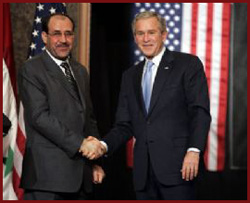
It seems that many observers were surprised by the President's remarks on the Maliki government. In his comments, the President indicated that the progress of the Maliki government was insufficient. He also signaled he would accept the replacement of the embattled leader if it were the will of the Iraqi people.
I'll offer my own cynical take on the President's comments after providing the following excerpts.
MONTEBELLO, Canada, Aug. 21 -- President Bush pointedly declined Tuesday to offer a public endorsement of embattled Iraqi Prime Minister Nouri al-Maliki, expressing his disappointment at the lack of political progress in Iraq and saying that widespread popular frustration could lead Iraqis to replace their government.
"The fundamental question is: Will the government respond to the demands of the people?" Bush said. Stopping short of directly endorsing Maliki, as he has on several previous occasions, Bush continued, "If the government doesn't respond to the demands of the people, they will replace the government."
White House aides said later that Bush's comments did not mean he was withdrawing support from Maliki but were simply a statement of reality -- that Iraqis were growing frustrated and that under the country's new democratic system, the people could decide to replace the current government with a more capable one. But the president's tough words -- together with similar strong statements from the top U.S. diplomat in Baghdad -- suggested that the administration's patience with the current leadership is wearing thin.
"There's not a strong sense anywhere, really, of the central government being present and active in making conditions in Iraq better," Crocker said at a news briefing three weeks before he and Gen. David H. Petraeus, the top U.S. commander in Iraq, are scheduled to present a progress report to Congress. "They've got to do more of that."
I view the statement of the President to be a strategic calculation in anticipation of General Petraeus' report on the troop surge which is scheduled to be delivered by mid-September. Here's the equation. September is going to be a critical month in determining the future of Iraq.
The Iraqi government is scheduled to reconvene in early September and will likely face a challenge to the Maliki government as well as growing U.S. demands to reach some long expected political resolutions. Simultaneously, the Bush administration has committed to provide Congress with a progress report on the troop surge.
Let's suppose that the Petraeus report will indicate some progress but will also suggest that the troop presence cannot be maintained in the long term...meaning that the Iraqi government must forge some agreements which will quickly begin to lessen the sectarian conflict that is undermining the military progress.
Let's also suppose that the Bush administration is doubtful that Maliki can withstand the coming onslaught and they believe he is likely to be removed from office. All indications suggest that such an outcome would likely come sooner than later...very possibly in September.
Now putting two and two together, the worst possible scenario for the Bush administration would be to find itself still strongly supporting the Maliki government while also receiving a report from Petraeus stating that military progress has been achieved but also that it will be for naught if the Maliki government can't forge a functional government.
In order for the Bush administration to have any hope that Congress (especially the many Republicans who have hinted they are ready to jump ship) will afford the President more time to succeed in Iraq, it must not find itself having touted a surge that was nullified by the political meltdown of the Maliki government.
Further, if the Maliki government is destined to fail, the Bush administration cannot be seen as being blind-sided by the event; it must distance itself now and be prepared to handle the probability of a new government as an orderly transition and a matter of fact rather than as an unforeseen crisis with uncertain ramifications. Such an event must be portrayed in a favorable light even if it is difficult to predict that reality or to plan for such an eventuality.
The bottom line is that the Bush administration cannot allow the Petraeus report to be issued in the midst of a government collapse for which it hasn't prepared Congress and the American people. I believe it is safe to assume that the Petraeus report is going to be more positive than negative...and that will happen one way or another.
For the Bush strategy to have any hope of proceeding, the Petraeus report has to be accompanied by some semblance of political progress...even if that will inevitably be the installation of a new government. A fully supported Maliki government on the precipice of collapse would be a disaster for the President. At least a new government would allow the Bush administration to spin it as part and parcel of demonstrable progress. It would also allow the Bush administration to contend that the long-standing political logjam had been broken...and that could be coupled with a positive military report to form the rationale for a continuation of the existing strategy.
The bottom line is that the Bush administration knows full well that September is a make or break moment. As such, distancing itself from the Maliki government is required. To do otherwise is far too risky. It also allows Bush to find common ground with those in Congress who are calling for the ouster of the Maliki government...a move that would serve to neutralize the use of such demands as the reason to halt the ongoing U.S. involvement. In the end, September must be spun as a success or Congress will begin the process of forcing an end to the occupation.
Those opposed to the war need to be mindful of the stakes and the various strategies or they will find themselves outfoxed and moving into October with little to show for their efforts. Bush's brain may be departing soon but the President's detractors would be foolish to underestimate the determination of this President and his fellow neocons to complete their intended mission. Look for the President to pull out all of the stops.
Tagged as: General David Petraeus, George W. Bush, Iraq, Neocons, Nouri al-Maliki
Daniel DiRito | August 21, 2007 | 9:38 PM |
link
| Comments (0)


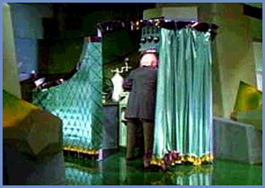
Fred Barnes, in an editorial at the Wall Street Journal, offers his manifesto for Republican resurgence. Unfortunately, from my perspective, the piece is a textbook demonstration of the degree to which GOP insiders haven't a clue with regards to the concerns of ordinary Americans as well as the existing political realities. Even worse, much of the piece is an exercise in the "if only" mentality one might expect to find in the Harry Potter world of fantasy and magic. The following excerpt is wholly illustrative.
Clearly the war hurt, more than a little. Just as clearly, a turnaround in Iraq would help enormously.
But even if the "surge" is as successful as it appears it might be, there's a problem. While public support has increased recently, the war still faces deep-seated opposition. There's a widespread view that its cost in lives, money and national prestige has been too high. This won't change overnight. Public opinion isn't quite that fickle.
It's not immutable, however. What if military success by Gen. David Petraeus, the American commander, is matched by a political breakthrough engineered by Iraqi Prime Minister Nouri al-Maliki? Or matched by the acceleration of political reconciliation at the provincial rather than the national level in Iraq? Either scenario is possible.
I'm willing to concede that anything is possible in this world of uncertainty...but to assume that all of the above will transpire seems akin to Mr. Barnes believing that he holds the winning Power Ball ticket. Yes, it could happen...but it is hardly a reasoned piece of journalistic conjecture.
While Barnes is imagining a political breakthrough, Senator Levin and others are suggesting that the Maliki government is not only an obstacle to progress; it may need to be removed for any hope of political reconciliation to emerge. Shouldn't a Wall Street Journal piece offer more than the fanciful thought one might find on a slip of paper removed from a fortune cookie?
For the sake of those within the GOP who are actually seeking a blueprint for a return to relevance, may I suggest that the content of this editorial may not be the horse upon which to hitch their hopes?
Mr. Bush can't erase the memory of his inept handling of Hurricane Katrina. But if another disaster occurred and the president responded effectively, that would counteract the memory of his Katrina performance.
OK, if this is part of the Barnes plan, why not be bold and ask Pat Robertson and the 700 Club to pray that god's wrath be brought upon another sinful city so that the President can redeem his poor performance. Never mind that this sounds like Barnes is wishing America experience a natural disaster in order to achieve political gain.
As I recall, each time a Democrat has mentioned the possibility of a terrorist attack and that we are no safer as a result of the invasion of Iraq, the GOP has pounced upon such statements as vile, unpatriotic demonstrations of blatant partisanship...going so far as to argue that the Democrats hate America and calling such statements a willingness to sacrifice American lives for political capital. Conversely, is hoping for a natural disaster a noble cause if it helps the GOP?
On fiscal issues, Democrats foolishly dismissed the president's insistence on cutting $22 billion from overall discretionary spending, claiming it was a puny amount. To them, it is. To the public, it's not. A veto war on spending bills is likely to work in Mr. Bush's favor, though not if weak-willed congressional Republicans cut and run. Should it lead to a government shutdown--call it the shutdown trap--that would be all the more harmful to Democrats.
On taxes, Democrats appear confident there's no trap at all, so long as they don't raise taxes on the middle class. Thus congressional Democrats have felt free to pass tax hikes this year on energy companies, foreign corporations and cigarettes, and they're poised to repeal the Bush tax cuts for those earning more than $200,000 a year.
Republicans believe Democrats have misread their mandate on taxes. We'll see.
Fred, where have you been while this President has nearly doubled the national debt from 5 trillion to 9 trillion? Have you forgotten that this is the President who enacted the largest entitlement program in recent history with the passage of his prescription drug benefit? When the Democrats fail to get excited about 22 billion dollars, they do so while pointing to the borrow and spend backdrop that has typified the Bush administration.
As to the tax hikes which Barnes feels will hurt the Democrats, clearly the number of Americans impacted by such increases is miniscule...but then again, I doubt Barnes spends much time with ordinary citizens. Frankly, Barnes might want to consider the possibility that voters have grown weary of tax cut promises from the GOP. Putting a few dollars into a voters pocket...while at the same time taking it out through inflation, wage stagnation, a suspect economy, declining home prices and sales, tightening credit, and the expenditure of 10 to 12 billion dollars each month on an endless war effort...doesn't seem like much of a winning strategy.
They practically invited Democrats to trump them on ethics and lobbying reform. And they've allowed their obsession with illegal immigrants to get out of hand. This drives away Hispanic voters and leaves the impression that Republicans are small-minded, ungenerous and nasty. The worst offenders are the presidential candidates, who would be wise to tone down their rhetoric on immigration.
Yes, nothing like embracing a strategy premised upon the notion that a leopard can suddenly lose its spots. The glaring omission in this suggestion is any understanding of where the GOP actually stands with regards to immigration...other than where Barnes posits may be most politically advantageous. Perhaps the fact that the Republican Party seems to treat this and so many other issues as nothing more than political calculations is what is troubling voters?
From my vantage point, Republican candidates have spent years using the immigration issue to pander to competing constituents such that the majority of the wells have been poisoned and the kool-aid is no longer potable. Weaving a workable message at this point would be akin to pulling a rabbit out of a hat.
As Karl Rove has noted, Republicans need a big idea. The best available is the one Mr. Bush abandoned: ownership. Allowing private investment of payroll taxes for Social Security would only be a start. An Ownership Society would allow individual Americans, rather than government, to control how and where their health care, public education, 401(k) and IRA funds are spent.
I'll give Barnes credit...if you're in the last act of a show that is undoubtedly destined to go dark...you might as well pull out all of the stops. Sadly, like most men who become enamored with their own self-interest, Barnes' Ownership Society finale is little more than the wish list of a man and a Party that has not only sought to raid the cookie jar...but has also decided that it is entitled to devour all of the delicacies on the dish.
In the ultimate miscalculation, Barnes' final words ring hollow to the many voters who can't afford this months rent, who work jobs that do not provide health insurance, who couldn't put money in a 401K even if the company offered one, and who haven't the time or the energy to invest social security funds for a future they can't begin to imagine as they try to scrape together the means to put enough food on tonight's dinner table.
I hate to be the one to break this to Fred...but after reading his manifesto, the final thought that crossed my mind was that it would be far easier for voters to simply vote for the Democrats than for them to hope that the Republicans can shed their sullied skin and suddenly become the compassionate conservatives they so masterfully marketed as none other than George Bush.
In the end, the Barnes piece has served one valuable purpose...it has made it abundantly clear why voters will likely relegate the GOP to the sidelines for the foreseeable future. In the meantime, maybe Mr. Barnes and his fellow Republicans can craft the next iteration of an ill-conceived illusion. One thing is certain, they would be well advised to choose a better wizard...one that isn't quite so visibly unable to manipulate the machinery as the drapes of deception are dismantled.
Tagged as: 2008, Fred Barnes, GOP, Immigration, Iraq, Katrina, Ownership Society, Social Security, Wall Street Journal
Daniel DiRito | August 21, 2007 | 10:29 AM |
link
| Comments (0)


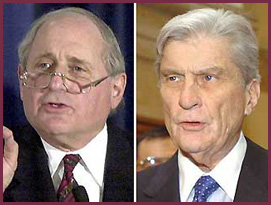
Following a trip to Iraq, Senator Carl Levin has suggested that the current Maliki leadership should be replaced with a less sectarian government...one that will seek political solutions to the many issues which remain unresolved and are serving as a source of ongoing conflict and violence.
In early September, the Iraqi government is set to reconvene following a month long break. At approximately the same time, General David Petraeus is scheduled to offer his much anticipated report on the troop surge and the prospects for an end to the ongoing violence.
In a tragic and ironic twist, it is possible that General Petraeus could be reporting the progress achieved by the recent troop surge at the very same time during which the Maliki government is being removed. The fact that this possibility exists simply highlights the oft made argument that the addition of more U.S. troops cannot provide the political solutions which will be necessary to establish a functional Iraqi society.
"I hope that the Iraqi assembly, when it reconvenes in a few weeks, will vote the Maliki government out of office and will have the wisdom to replace it with a less sectarian and a more unifying prime minister and government," said Sen. Carl Levin, chairman of the U.S. Senate Armed Services Committee.
The two senior lawmakers issued a joint statement saying that while the U.S. military "surge" in Iraq has given Iraqi politicians some breathing room, they have failed to make the compromises needed to bring peace to that war-torn nation.
"We are not optimistic about the prospects for those compromises," the Levin and Warner said in their joint statement.
Levin in a teleconference with reporters went a step further, suggesting the Iraqi parliament have a vote of no confidence and replace the Maliki government, which he said is built too much upon sectarian allegiances and connections.
"There's a consensus that there is no military solution and there is only a political solution, and that's truer now than it has ever been, and the gridlock has got to end in that government if there's going to be a political solution," Levin said.
Once again, I expect to hear the Bush administration tout the temporary progress while asking the American public and Congress to be patient as we near the achievement of our elusive goal.
Unfortunately for the President, anyone remotely connected to reality will view such a request with utter contempt. Each and every time the Bush administration has requested and been granted the latitude to prosecute this war as it sees fit, the results have failed to meet the projections.
The administration continues to ignore the clear and consistent obstacles...obstacles that have originated with the failures of the Iraqi leadership and which will not cease until such time as there is a government focused upon a united Iraq. Until Iraq has a leadership that isn't focused first and foremost upon establishing a sectarian hierarchy designed to pursue power and profit, the efforts of the United States will be little more than the means by which U.S. soldiers are placed in harms way.
While most Americans would like to see a solution to the Iraqi quagmire, history tells us to expect more of the same. Such a strategy is no longer tenable and should not be tolerated.
Tagged as: Carl Levin, David Petraeus, Iraq, John Warner, Nuri al-Maliki, Sectarian violence, Troop surge
Daniel DiRito | August 20, 2007 | 7:02 PM |
link
| Comments (0)



Karl Rove and other GOP operatives like to tell the American public that President Bush is a man who has demonstrated strength and conviction when confronted with difficult situations. Unfortunately, many of the President's critics view those same traits as an indication that the President is prone to stubbornness and is often unwilling to heed the advice of others.
A majority of foreign policy experts apparently agree with critics of the Bush administration...especially with regards to the recent surge in Iraq and the President's overall strategy in the war on terror. The numbers are reported in the most recent survey by Foreign Policy magazine.
As Congress and the White House await the September release of a key progress report on Iraq, 53 percent of the experts polled by Foreign Policy magazine and the Center for American Progress said they now oppose Bush's troop build-up.
That is a 22 percentage point jump since the strategy was announced early this year.
The survey of 108 experts, including Republicans and Democrats, showed opposition to the so-called "surge" across the political spectrum, with about two-thirds of conservatives saying it has been ineffective or made things worse in Iraq.
Foreign Policy, published by the Carnegie Endowment for International Peace, said the experts polled on May 23 to June 26 included former government officials in senior positions including secretary of state, White House national security adviser and top military commanders.
Foreign Policy said seven of 10 experts supported the redeployment of U.S. forces from Iraq. Experts have increasingly cited the war as the root cause of what they believe to be U.S. failure to win in its war on terrorism.
More than 80 percent of the experts said they expected another September 11-scale attack on the United States over the next decade, despite what they described as significant improvements among U.S. security, law enforcement and intelligence agencies.
A decade from now, the Middle East still will be reeling from the ill-effects of the Iraq war, particularly heightened Sunni-Shi'ite tensions in the region, 58 percent said.
Thirty-five percent believed Arab dictators will have been discouraged from pursuing political reforms as a result.
Only 3 percent believed the United States will achieve its goal of rebuilding Iraq into a beacon of democracy within the next 10 years.
Despite the President's strong support from a handful of apologists, it appears that most experts simply view George Bush's intransigence as a sign of a fatally flawed strategy and an unwillingness to accept the realities that have become painfully obvious some four plus years after the decision to invade Iraq.
While the President holds to his vision of a burgeoning democracy and the presence of a close American ally in the volatile Middle East, most experts believe that the decision to topple the Hussein regime will do little more than radicalize the region.
As regional populations grow increasingly skeptical of the presence and intentions of the United States, the leadership of these nations will likely seek to distance themselves from the United States. Further, the growing calls for a rejection of Western culture could lead many Middle Eastern countries towards more radical versions of Islamic law and a growing hostility towards the United States.
During the announcement that Karl Rove would be leaving Washington and his service in the Bush administration, the President stated, "I'll be on the road behind you here in a little bit". By all accounts, that moment can't come soon enough for many experts and most Americans.
Tagged as: Foreign Policy, George W. Bush, Iraq, Islamic extremism, Middle East
Daniel DiRito | August 20, 2007 | 9:08 AM |
link
| Comments (6)



Rudy Giuliani apparently thinks our next president ought to conduct America's foreign policy in the same manner he navigated the end of his last marriage...an in your face flaunting of one's ability to do what one chooses regardless of how it might be perceived and who might get hurt in the process. Perhaps I'm being too harsh...after all...he does have more experience than most.
Never let it be said that Teddy Roosevelt had anything on Rudy Giuliani. The esteemed former mayor turned modern day Rambo apparently believes one should not only carry a big stick...but one ought to loudly and clearly shout out who is scheduled to receive the next clubbing. Perhaps he and Dick Cheney could enjoy spending vacation time together clubbing baby seals?
In the course of a week, Giuliani has offered perhaps the most ill-conceived view on foreign policy since...oh, let's see...George Bush?! Better still, Giuliani, in his apparent wisdom, has decided to one-up George Bush by arguing that efforts to establish a Palestinian state may have been far too hasty and it may be time to reconsider the need for more preconditions.
From The New York Sun:
"Too much emphasis has been placed on brokering negotiations between the Israelis and the Palestinians -- negotiations that bring up the same issues again and again," Mayor Giuliani writes in an essay published yesterday in Foreign Affairs. "It is not in the interest of the United States, at a time when it is being threatened by Islamist terrorists, to assist the creation of another state that will support terrorism."
In some of the boldest language on the Israeli-Palestinian conflict used thus far by any presidential candidate, Mr. Giuliani writes: "Palestinian statehood will have to be earned through sustained good governance, a clear commitment to fighting terrorism, and a willingness to live in peace with Israel."
That language appears to be a direct shot at President Bush and Secretary of State Rice, who are making just such a push for final status negotiations between President Abbas and Prime Minister Olmert in September, despite Hamas's takeover of Gaza in June.
Mr. Giuliani's senior foreign policy adviser, Charles Hill, said yesterday that the Bush administration's current push to forge a peace deal between the Palestinian Authority president and the Israeli prime minister may be "risking too much."
Mr. Hill went further yesterday, saying he does not expect that Mr. Giuliani, if he becomes president, would support Iraqi national elections, scheduled for 2009, if it appeared that they would empower Islamist terrorist parties and others with their own private armies. "We would have to look at the situation at that time," he said.
Prior to the 2000 presidential election, George Bush told voters that he was opposed to nation building. Over six years later, the President not only favors nation building; he considers it his divinely inspired mission to deliver freedom and democracy to the oppressed peoples of the world.
Reading between the lines of the Giuliani manifesto, this process would be continued, though he seemingly favors a slower implementation of open elections. As I read the Giuliani approach, he would only implement a fully democratic government when he was convinced the decisions of the voting public would meet with his favor. After all, why shouldn't the exporter of democracy have the prerogative to dictate the type of freedom he wants to install?
Apparently Mr. Giuliani believes such benevolent meddling will be met with thankful acceptance from the recipients. If not, I presume the new and improved "decider" might conclude it's time to pull out a larger Louisville Slugger and pummel the misguided until such time as they realize what's good for them.
Good for Giuliani...at least he doesn't seem apt to make the Cheney mistake of promising us a rose petal parade. His approach seems to be much more measured...I think he'll be happy with a few strategically placed statues expressing a sufficient level of homage to the liberator.
No doubt Rudy must fashion himself as the law and order candidate. If I didn't know better, I might conclude that Mr. Giuliani is determined to prove that wearing a skirt should never be seen as a sign of weakness. While that may seem inconsequential, keep in mind that Hillary, his potential opponent, does wear pants.
Given this bold effort to portray a tough guy image, maybe the campaign should adopt a new slogan, "Look out world, there's a new sheriff in town". On second thought, that could prove risky...he did spend a lot of time in the Village...people.
Tagged as: 2008 Election, Dick Cheney, Foreign Policy, Israel, Palestine, Rudy Giuliani
Daniel DiRito | August 15, 2007 | 3:28 PM |
link
| Comments (0)



In a surprisingly candid assessment, Pakistan's President, Pervez Musharraf, acknowledged that his country has become a haven for Islamic extremists. The statement came during a joint appearance with Afghanistan's President, Hamid Karzai following a meeting to discuss issues of concern to the neighboring nations.
Last week it was thought that Musharraf intended to declare the emergency but reports suggest that he was eventually talked out of the risky move.
My own estimation is that Musharraf is still laying the groundwork for a possible emergency declaration...a move that could be used to postpone free elections that are scheduled near the end of 2007.
Musharraf, if nothing else, is a shrewd politician who isn't inclined to lose his grip on power in Pakistan. I suspect that if his prospect of holding office continues to decline...and he is unable to form a coalition that would assure his victory in an election...that he wouldn't hesitate to declare an emergency premised upon the threat posed by extremists.
As recently as last month, Pakistan sharply disputed U.S. intelligence reports of a well-established Al Qaeda and Taliban presence in tribal areas on the Pakistani side of the border, where the central government has little or no authority.
After the release of a major U.S. intelligence report in July describing those areas as a haven for these groups, Pakistani officials said they had not been provided with hard evidence to back up the claims.
In his address, however, Musharraf acknowledged that "many of our border regions, especially the tribal areas, have been deeply affected by extremism."
"There is support from these areas to Taliban activity inside Afghanistan," he said. "There is no doubt Afghan militants are supported from Pakistani soil."
Musharraf described Islamic extremists as a "dark" force afflicting both Afghanistan and Pakistan. "Our societies face a great danger in the shape of fringe groups, a small minority that preaches hate, violence and backwardness," he said.
Keep a watchful eye on Musharraf as the elections approach. He's not likely to concede defeat without having first used every means to preclude such an eventuality.
Tagged as: Afghanistan, al Qaeda, Hamid Karzai, Pakistan, Pervez Musharraf, Taliban
Daniel DiRito | August 13, 2007 | 4:26 PM |
link
| Comments (0)


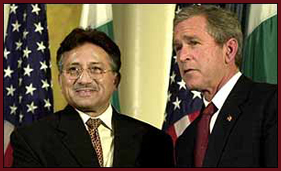
Every now and again, I decide to post an item that offers little more than an interesting observation...with little relevance in the larger scheme of things. I've been preoccupied with Pakistan and Pervez Musharraf of late...likely a function of my ADD tendencies...and after reading that the Pakistani President has decided against declaring a state of emergency in a new article in the Washington Post, I was struck by the similarities in the political strategies and skills of Musharraf and George Bush. I'll explain after the following excerpts.
Senior government officials said Wednesday that an emergency declaration was being considered. But after a call early Thursday from U.S. Secretary of State Condoleezza Rice, and dire warnings from his own advisers that such a move would have disastrous consequences, Musharraf appeared to abandon the idea.
"President Pervez Musharraf after hectic consultations with his colleagues has decided that emergency should not be declared in the country," Minister for Information and Broadcasting Muhammad Ali Durrani told Pakistani television, according to the country's official news service. "The main objective of the government is to ensure free, fair and transparent elections in the country . . . The President is very clear that steps like emergency can hinder the democratic process and should therefore be avoided," Durrani said.
Under the country's constitution, the president may impose emergency rule if Pakistan faces a severe internal or external threat. Such a decree could restrict freedom of speech and movement. Elections, now scheduled by year's end, could be postponed or suspended. Military analysts in Pakistan said emergency rule would not be accepted by the great majority of the public.
Musharraf took power in a bloodless coup in October 1999 and has since been a key ally in the U.S. fight against terrorism. Analysts say he has ruled with a relatively light hand, seeking to co-opt both political and religious groups while bending the laws to his political aims. He has hoped to be reelected by Parliament to another five-year term without having to give up his position as army chief.
Musharraf's popularity has tanked in recent months and there are indications he is attempting to build a coalition government with Benazir Bhutto, the former Prime Minister. As I read about the possibility of a state of emergency, my political antennae was alerted and I began speculating that Musharraf never intended to declare a state of emergency; rather it was a political stunt to force Bhutto to cooperate with the President since Musharraf will likely need her support to maintain power.
As I read the Washington Post article, it struck me that Musharraf is operating in much the same way as George Bush. Both are rather unpopular...and both seem to use fear to paralyze their opposition and to convince the voting public that their countries face bigger issues than an unpopular leader.
Musharraf invokes fear through threats of a state of emergency...based upon an internal threat from radical extremists supportive of the Taliban and al Qaeda; George Bush invokes fear through heightened concerns of terrorist attacks in the homeland sponsored by radical extremists connected to al Qaeda.
Musharraf, through the imposition of a state of emergency, has the power to restrict civil liberties in the interest of national security; George Bush, through the Patriot Act and the expansion of the FISA law, has the power to disregard long standing civil liberties in the interest of national security. Both men couch these measures as essential to protect the integrity of the nation...both men seem to invoke them when their approval ratings are low...and both men know how to use these issues to manipulate their political opponents.
Musharraf and Bush are both "Commanders in Chief" of their respective military establishments and each is willing to use the military to advance their respective political ideologies...often with a noticeable level of inconsistency...and frequently with a disregard for voter opposition.
Both have attempted to manipulate the judicial system in their favor ; George Bush through his embattled Attorney General ; Musharraf by attempting to remove the Chief Justice of the Supreme Court. As an aside, remember the Florida vote count fiasco and the Supreme Court declaring George Bush the president in 2000.
Back in 2006, when Musharraf signed an accord with the Pakistani tribal leaders who are frequently viewed to be supportive of the Taliban and al Qaeda, George Bush said that when Musharraf “looks me in the eye and says the tribal deal is intended to reject the Talibanization of the people and that there won't be a Taliban and there won't be al-Qaida, I believe him."
Bush also stated that “When he (Musharraf) looks in my eyes and speaks with confidence, I believe him." “He has been a strong and forceful leader with courage." Musharraf responded, “We trust each other."
Perhaps I should feel warm and fuzzy about the bond that these mutual statements seem to suggest exists between these two men...but when I couple this shared admiration with the above mentioned similarities...the ones that seem to limit civil liberties through the invocation of fear...I get a cold chill.
While I wholeheartedly reject conspiracy theories, I do have to admit that I've wondered if George Bush has ever thought about invoking a state of emergency such that he would consider suspending elections for a period of time. Each time the thought has entered my mind I've immediately discounted it as nonsense.
As I read this Washington Post article and drew the above comparisons, it took a little longer to convince myself that George Bush and Pervez Musharraf weren't birds of a feather. Consistent with my opening remarks, I certainly hope my interesting observations turn out to be irrelevant.
Tagged as: al Qaeda, George W. Bush, Osama bin Laden, Pakistan, Pervez Musharraf, Taliban, War On Terror
Daniel DiRito | August 9, 2007 | 1:10 PM |
link
| Comments (0)



Keep a close eye on Pakistan...both in terms of Musharraf's ability to hold power and also with regard to how the Democratic candidates frame their positions on handling the sensitive relationship. Bear with me while I elaborate.
Reuters is reporting that the embattled President is preparing to issue an emergency declaration that may well postpone the pending elections...elections in which he could be removed from office. While the report has not been confirmed by those within the Musharraf government, there is no doubt that he may be scrambling for the means to retain power in light of his recent decline in popularity.
ISLAMABAD, Aug 8 (Reuters) - Private Pakistani television channels reported on Wednesday that President Pervez Musharraf was preparing to declare a state of emergency imminently, but government spokesmen denied there were any such plans.
State-run Pakistan Television quoted official sources as saying the reports were baseless and Information Minister Mohammad Ali Durrani denied to Reuters that a meeting had been held to discuss the imposition of an emergency, as rumours swept the country.
A member of the inner circle of the Pakistani leadership told Reuters, however, that U.S. ally Musharraf was considering the option, which could allow him to extend the tenure of the national and provincial assemblies by 12 months and delay elections due by the turn of the year.
The government could explain such a step by citing growing insecurity because of the threat posed by Islamist militants allied to the Taliban and al Qaeda after a series of attacks, many of them by suicide bombers, in the past month.
Political analysts and opposition leaders, however, have feared that Musharraf, who is going through his weakest period since coming to power in a 1999 coup, might resort to an emergency because of difficulties he faces in getting re-elected by the sitting assemblies, while still army chief.
A not-so-secret meeting in Abu Dhabi in late July with former Prime Minister Benazir Bhutto, leader of the largest opposition party, to try to agree terms for power sharing was indicative of how desperate Musharraf's position had become.
She [Bhutto] wants Musharraf to quit the army and guarantee free and fair elections before she will countenance any deal.
I keep coming back to the situation in Pakistan because I contend that it will be pivotal in the U.S. effort to combat terrorism...and it may also decide the 2008 presidential election. The recent back and forth between Barack Obama and Hillary Clinton shines a spotlight on the tenuous status of our relationship with Pakistan, the fragility of Musharraf's hold on power, and the importance Pakistan may play in pre-election politics.
At the same time, it is important to monitor the Bush administration's delicate handling of the situation in Pakistan. First, the relevant backdrop. Clearly, Pakistan isn't Afghanistan or Iraq but the fact that the Bush administration is quick to acknowledge its sovereignty seems to be a subtle deviation from the Bush doctrine announced shortly after 9/11...the one that sent a message to other nations that they were either with the United States or they were with the terrorists.
While Musharraf is regarded as an ally in the war on terror, few would disagree with the observation that Pakistan has been far more placating to terrorists and their Pakistani sympathizers than the United States would prefer. At the same time, the patience of the Bush administration is uncharacteristic...which I contend results from a realization that the U.S. is currently in no position to prosecute a war in Pakistan due to our commitments in Iraq and Afghanistan.
With that background, we can return to the bickering between Obama and Clinton. I suspect that the dust up indicates a realization that Pakistan is an important strategic consideration for 2008 that must be handled with the utmost of discretion. Let me explain.
Let's assume that both camps realize that the United States isn't in a position to risk a protracted battle in Pakistan should an American incursion lead to the toppling of Musharraf by extremists aligned with the Taliban and al Qaeda. Let's also assume that both camps have concluded that if a terrorist strike were to occur on U.S. soil prior to the 2008 election, it would elicit growing voter cynicism about the handling of the war on terror and lead to an advancing belief that the invasion of Iraq had distracted us from the prevailing issue of capturing or killing those responsible for 9/11.
With those assumptions, both candidates must feel compelled to position themselves to react to such a hypothetical...knowing that a strike on the homeland will undoubtedly alter the dynamic of the 2008 election.
Here's the equation and the calculation. A hypothetical terrorist attack on the United States would likely be viewed to have been executed by Osama bin Laden and al Qaeda...from the organization's hideout that most experts believe to be located in Pakistan.
Voters would immediately look for answers and explanations as well as begin to review what has been stated on the topic in advance of a terrorist strike by the Bush administration and those running for president. There will be questions of what we knew, what we were doing to prevent an attack, and what kept us from a more aggressive approach with regards to Musharraf and Pakistan.
Some will conclude that we were unfortunately bogged down in Iraq...that we were focused on the Bush goal of toppling Hussein and establishing a foothold in the oil rich Middle East...and that we therefore failed to recognize or act upon the threat in Pakistan.
Opposition to the war in Iraq would likely expand and demands for an immediate withdrawal would predictably grow louder. Doubts about the Bush administration's handling of the war on terror would force voters to look to the 2008 presidential candidates in search of a strong leader with a tough strategy for combating terrorism which they could support...preferably an individual that had already voiced serious concerns about the situation in Pakistan and our apparent inaction.
As I've listened to the Pakistan debate between Senators Clinton and Obama...as well as commentary from the pundits on the merits of each candidates remarks...I've concluded that the pundits have yet to consider the scenario outlined in this posting.
While Obama has been criticized for stating that he wouldn't hesitate to act upon good intelligence and order a strike in Pakistan, I'm of the opinion that he knows full well why he chose to make such a statement...and cleverly coupled it with his contention that he has opposed the war in Iraq from the outset and argued that it kept us from capturing or killing the terrorists responsible for 9/11.
I suspect he did so because he knew he couldn't overcome Clinton's experience...but he could position himself as the candidate who voted against the war (funding), the candidate who believed the war in Iraq did nothing to pursue those who perpetrated 9/11, the candidate who called for an aggressive approach to the presence of al Qaeda in Pakistan, and the candidate who wasn't afraid to telegraph a stern message to Musharraf in advance of any possible terrorist attack.
I view his remarks to be a well reasoned political calculation...a measured risk with little down side and the potential for significant benefit. If Obama wants to best Hillary Clinton...and I have to believe that he does...it will likely require more of the same. His choice of Pakistan as his first foray into such a strategy may well be a brilliant move. Given the growing uncertainty surrounding Musharraf and the accelerating concerns about the reconstitution of al Qaeda in Pakistan, he has little to lose. Score one for the Obama camp.
Tagged as: 2008 Election, al Qaeda, Barack Obama, Hillary Clinton, Osama bin Laden, Pakistan, Pervez Musharraf, War On Terror
Daniel DiRito | August 8, 2007 | 2:09 PM |
link
| Comments (6)



In a follow up to Monday's report which stated that the United States could not account for 190,000 weapons provided to Iraqi security forces, General David Petraeus told Alan Colmes of Fox News Radio that the loss resulted from inadequate accounting practices.
As I read the General's contention, it seems that the U.S. military is arguing it lacked the means to record the serial numbers during the distribution process.
"Some percentage" of weapons the U.S. military provided to the Iraqi army and Iraqi police units were not tracked by serial number because there were no procedures in place to do so within the Iraqi units, Petraeus said in an interview broadcast last night on Fox News Radio's "Alan Colmes Show."
From a practical standpoint, Petraeus added, it was more important to get the weapons to the Iraqis as they started to enter the fight against a strong insurgency than it was to keep meticulous records.
"We occasionally likened it to building the world's largest aircraft while in flight and while being shot at," the general said. "But we gradually started putting those procedures into place."
What?! You've got to be kidding. So following the invasion of Iraq, our military leaders determined that it wasn't critically important to record the serial numbers of the weapons being provided to Iraqi security forces...the same forces which have known ties to sectarian and insurgent groups, a propensity for corruption, and huge numbers of defections.
I must be missing something. We regularly hear U.S. objections to Iran providing weapons to sectarian and insurgent groups...and the media is provided with evidence (serial numbers or other identifying characteristics?) that such weapons were either manufactured in Iran or sold to Iran and then exported to Iraq...but our military didn't mind distributing nearly 200,000 weapons without so much as writing down a serial number next to the name of the Iraqi soldier who was receiving said weapon?
I may be wrong, but wouldn't having those serial numbers allow us to track the weapons that end up in the wrong hands? Wouldn't it also allow us to track down the Iraqi soldier responsible for losing or giving or selling his weapon to those who are killing U.S. soldiers? I can't be sure, but I would bet that every weapon given to a U.S. soldier is recorded...meticulously.
I have this frightening picture in my mind of box after box of deadly weapons being placed in Iraqi controlled trucks to be delivered to Iraqi security forces...and then I imagine the numerous ways that might not happen.
One, the driver, aware that the serial numbers are not being recorded, keeps some of the weapons to sell to anyone who will offer him money. Two, the weapons arrive at an Iraqi compound and an official in a position of power with ties to insurgents receives the weapons and transfers them to his allies to be used against U.S. soldiers. Three, the boxes are opened and anyone in the compound is given access to a weapon...even those who have signed up with nothing more than the intent of obtaining a weapon and then defecting.
He [Petraeus] described one case in which U.S. forces flew into the war zone of Najaf at night, their helicopters under fire, and "actually [were] kicking two battalions' worth of equipment off the ramp and getting out of there while we still could."
"That type of decision was something that we made at the time because those forces needed those weapons and that equipment," Petraeus told Colmes. "We weren't going to stay there in the dark and make guys do a serial-number inventory and sign them up, and that is what happened. We believe those weapons all certainly were given to Iraqi units."
OK, forget the boxes of weapons being loaded into trucks...we're dropping them out of aircraft to the folks lurking below. Now I don't want to downplay the difficulty of war and the occasional need to abandon protocol...but situations like this make me think of one of my dad's favorite stories. He was pulled over by the State Patrol for a burnt out light on his vehicle and the officer asked him for his drivers license.
My dad handed him his license and the officer looked it over...and then he told my dad that he should have remembered the words he'd written on the back of his license..."Prior Proper Planning Prevents Poor Performance" and perhaps he wouldn't have been so careless as to allow his driver's license to expire.
As I think about the situation described by General Petraeus, I can't help but question the degree to which this operation in Iraq has lacked an understanding of these six "P's". Time and again, the evidence suggests that the U.S. planning was sorely lacking, and not just on one occasion, but at virtually each juncture of the mission.
Another recent article gives further reason for concern...as well as support for the contention that the United States had little appreciation for the complexity of the sectarian differences and the overwhelming mistrust that exists between the various tribal groups.
ABOARD A U.S. AIR FORCE PLANE — Secretary of Defense Robert Gates, returning from a four-day trip to the Middle East, offered a pessimistic view of Iraq's political progress Thursday, saying he thought that the United States had underestimated the level of distrust between the Shiite Muslim-led government and other ethnic groups.
"I just think in some ways we probably all underestimated the depth of the mistrust and how difficult it would be for these guys to come together on legislation, which, let's face it, is not just some kind of secondary thing," Gates said aboard his plane en route to Washington.
"The kinds of legislation they're talking about establish the framework of Iraq for the future, so it's almost like our constitutional convention. . . . And the difficulty in coming to grips with those we may all have underestimated six or eight months ago," when the Bush administration began implementing its policy of a U.S. troop buildup.
While Secretary Gates can't be blamed for the lack of planning in advance of the invasion, his remarks provide a clear understanding of the problems we're facing in the aftermath of the fall of Saddam Hussein.
In all honesty, the depth of the animosity between the various groups should have come as no surprise. Under Hussein, the Sunni minority routinely abused the Shiite majority and we should have anticipated there would be a desire to avenge the many atrocities and a rush to amass power.
Reports that General Petraeus has had difficulty pushing Prime Minister Nouri al-Maliki to move forward with necessary political change and compromise illuminates the depth and degree of mistrust mentioned by Secretary Gates and it should have been anticipated. It also highlights the ongoing miscalculations that seem to be the hallmark of a Bush administration which has focused far too much energy on rhetoric and far too little time on a rational and reasoned strategy for success.
In the end, the fact that so many weapons were distributed without proper planning is a further example of the failures that have undermined our efforts to bring resolution to Iraq...but it is also an alarming revelation that our carelessness may have actually endangered the lives of our American soldiers. That is inexcusable.
Tagged as: Alan Colmes, General David Petraeus, Iraq, Nouri al-Maliki, Secretary of Defense Robert Gates, Sectarian Conflict
Daniel DiRito | August 8, 2007 | 10:01 AM |
link
| Comments (1)


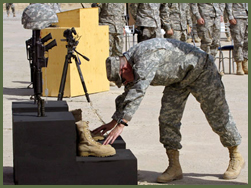
UPDATE:
The August 7, 2007 CBS News article cited in this posting indicated that 26 U.S. soldiers had been killed in the last week in Iraq. It is unclear if these 26 deaths all occurred during the first seven days of August. According to the most recent update on GlobalSecurity.org, as of August 6, 2007, 22 U.S. soldiers had been killed in Iraq.
_____________________________________________________
ORIGINAL POSTING:
Just seven days after being told that U.S. troop casualties in July were the lowest seen in some eight months, the number of soldiers lost in August has already reached 26.
While the lower July number has been touted as evidence of the success of the surge, the fact remains that the number of troop deaths (79) in July of 2007 still exceeded the number killed in July of the three previous years. The number of soldiers killed in July of 2006 was only 43.
CBS/AP) The U.S. military tells CBSNews.com that 26 American service members have been killed in action in Iraq in the past week alone, including three soldiers who were killed by a single roadside bomb attack reported Tuesday.
The deaths raised to at least 3,678 members of the U.S. military have died since the Iraq war started in March 2003, according to an Associated Press count.
August has begun with a wave of U.S. troop deaths in Iraq, on the heels of a relatively low death toll in July, which was cited by commanders as an indication that the build-up of American troops in and around Baghdad was reducing violence.
In addition to the alarming number of troop deaths, the Maliki government lost five more Cabinet members, bringing to 17 the total number of ministers who have broken from the government as a result of numerous unmet demands. The news comes on the heels of the recently announced recess of parliament which isn't scheduled to end until early September.
From The International Herald Tribune:
BAGHDAD: The five Cabinet ministers loyal to Iraq's first post-Saddam leader will boycott government meetings, further deepening the political crisis that threatens to swamp the administration of Prime Minister Nouri al-Maliki, two lawmakers said on Monday.
The boycott of Iraqiya List ministers loyal to former Prime Minister Ayad Allawi left the government, at least temporarily, with no Sunni participants. That was a deep blow to al-Maliki's attempt to craft reconciliation among the country's majority Shiites and minority Sunnis and Kurds.
"Our ministers did not attend, because our block has several demands that have not been met. We demanded broader political participation by all Iraqis to achieve real national reconciliation...and an end to sectarian favoritism," al-Azawi said.
The boycott raises to 17 the number of government ministers who have either suspended membership or quit this year.
Despite calls from the Bush administration to allow the troop surge to succeed, all of the evidence coming from the Iraqi government suggests that the country would lack the means to proceed even if the additional troops achieved some level of expanded stability and security.
Unless the sectarian differences can be resolved, it is hard to imagine that the Iraqi's would be able to sustain any of the hoped for progress. Frankly, it appears that the Maliki government may be on the verge of a total collapse...an event that would inevitably signal more unrest and sectarian conflict.
From The Middle East Online:
"The government cannot survive all these defections," said Joost Hiltermann, the chief Iraq expert at the International Crisis Group think tank, after the secular Iraqi National List said its four ministers are boycotting cabinet.
"The Shiites and the Kurds don't want to cede power to people they don't trust. But if they don't, there won't be reconciliation. Then all we can look forward to is civil war," he said from Amman.
"Frankly, even with everyone in, there was total paralysis of government. Everyone is waiting for the top leadership to meet and cut a different kind of deal," he noted, with pessimism.
Last week, a report by Stuart Bowen, the US chief inspector of Iraqi reconstruction, painted a damning picture of government failure, and described the effects of corruption as being akin to a "second insurgency".
While the Bush administration proceeds with the surge, virtually every other event in Iraq seems to be deteriorating or on the verge of collapse. Perhaps I'm too pessimistic, but the tea leaves don't seem to support the optimism we're hearing from the president.
Tagged as: al Maliki Government, Cabinet Resignations, Iraq, Sectarian Conflict
Daniel DiRito | August 7, 2007 | 11:11 AM |
link
| Comments (0)


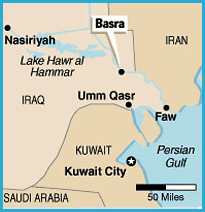
Those looking to understand the impact of the latest troop surge in Iraq might want to review the situation in Basra, the southern city previously occupied by British forces and frequently referred to as a model for the progress sought throughout the country. Unfortunately, in the aftermath of the drawdown of troops, Basra has become a city of violence as competing sectarian groups are now battling for political supremacy and access to valuable oil reserves.
Three major Shiite political groups are locked in a bloody conflict that has left the city in the hands of militias and criminal gangs, whose control extends to municipal offices and neighborhood streets. The city is plagued by "the systematic misuse of official institutions, political assassinations, tribal vendettas, neighborhood vigilantism and enforcement of social mores, together with the rise of criminal mafias that increasingly intermingle with political actors," a recent report by the International Crisis Group said.
For the past four years, the administration's narrative of the Iraq war has centered on al-Qaeda, Iran, and the sectarian violence they have promoted. But in the homogenous south -- where there are virtually no U.S. troops or al-Qaeda fighters, few Sunnis, and by most accounts limited influence by Iran -- Shiite militias fight one another as well as British troops. A British strategy launched last fall to reclaim Basra neighborhoods from violent actors -- similar to the current U.S. strategy in Baghdad -- brought no lasting success.
Militias and criminal gangs are financed in part by stolen oil smuggled outside the country, even as Iraq lacks enough energy to provide electricity to many of its people. Both the oil industry and the port facilities -- providing Iraq's only maritime access -- have made Basra "a significant prize for local political actors," the ICG said.
The current U.S. security operation to "clear, hold and build" in Baghdad and its surroundings is almost a replica of Operation Sinbad, which British and Iraqi forces conducted in Basra from September 2006 to March of this year with a mission of "clear, hold and civil reconstruction." Although Operation Sinbad initially succeeded in lowering crime and political assassinations, attacks rose in the spring and British forces withdrew into their compounds.
In a recent BBC interview, Air Chief Marshal Jock Stirrup, chief of the British defense staff, insisted that Basra has been a success. But he acknowledged that judgment depended on "what your interpretation of the mission was in the first place," adding: "I'm afraid people had, in many instances, unrealistic aspirations."
The mission, he said, was simply to "get the place and the people to a state where Iraqis could run this part of the country, if they chose to."
While some may be surprised by the deterioration in Basra, I would argue that it actually typifies what has been happening in Iraq during much of the occupation. In what many have called a game of whack-a-mole, the limited numbers of troops have facilitated a process whereby security is achieved in designated areas but soon after the troops are relocated to other hot spots, the chaos and violence resumes.
The results in Basra suggest that the latest U.S. troop surge in Baghdad may be destined for the same disappointing outcome. Keep in mind that over the course of the occupation, added troops have been sent into Baghdad with similar initial success...only to be followed by growing unrest.
Adding to the problem is the fact that the Iraqi security forces are poorly trained as well as plagued by sectarian influences such that they have often been responsible for much of the resurgent conflict. Hopes that the Iraqi security forces can assume a responsible role in the absence of coalition troops may well be unrealistic.
The war torn nation has been split along sectarian lines for decades and there is little reason to believe that those differences will be set aside once the U.S. led forces are reduced. The fact that Iraq is blessed with huge oil resources may only complicate the situation as groups jockey for political power in order to influence the distribution of the wealth. The inherent lack of trust undoubtedly leads each sectarian group to believe that having access to power will guarantee access to the untapped wealth.
In truth, the fact that this process has been unfolding for nearly five years ought to instruct those seeking to predict the potential for future success. It is hard to imagine that more time will mean more progress…unless of course one is talking about an occupation similar to that seen in the Korean peninsula. Unfortunately, it appears that change in Iraq will need to be a function of generational shift…a lengthy process that would require a U.S. presence for many years.
Given the overwhelming opposition to the ongoing occupation, it is hard to imagine a plausible solution that includes a lengthy U.S. presence. In the end, it appears that the Iraqi’s will have to find the means to resolve their differences sooner rather than later or face the prospect of chaos and violence for many years to come.
Tagged as: Basra, Iraq, Oil Reserves, Sectarian Conflict, Troop Surge
Daniel DiRito | August 7, 2007 | 8:34 AM |
link
| Comments (0)


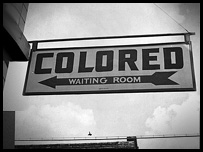
It seems that each day brings a new report from Iraq which leaves me wondering what we're thinking and what we hope to achieve. The latest comes from the McClatchy News Service and it involves segregated bathroom facilities on U.S. bases. Much like the United States prior to the civil rights era, signs are posted on the bathrooms telling Iraqi's that they are prohibited from using the same latrines as their American counterparts.
FORWARD OPERATING BASE WARHORSE, Iraq — The sign taped to the men's latrine is just five lines:
"US MILITARY CONTRACTORS CIVILIANS ONLY!!!!!"
It needed only one: "NO IRAQIS."
Here at this searing, dusty U.S. military base about four miles west of Baqouba, Iraqis — including interpreters who walk the same foot patrols and sleep in the same tents as U.S. troops — must use segregated bathrooms.
Another sign, in a dining hall, warns Iraqis and "third-country nationals" that they have just one hour for breakfast, lunch or dinner. American troops get three hours. Iraqis say they sometimes wait as long as 45 minutes in hot lines to get inside the chow hall, leaving just 15 minutes to get their food and eat it.
It's been nearly 60 years since President Harry Truman ended racial segregation in the U.S. military. But at Forward Operating Base Warhorse it's alive and well, perhaps the only U.S. military facility with such rules, Iraqi interpreters here say.
Other soldiers traced the regulations to what they called cultural differences between the Iraqis and the Americans.
"We've had issues with locals," said Staff Sgt. Oscar Garcia, who mans Warhorse's administrative hub. "It's not because we're segregating."
But the Iraqis who're paid $80,000 to $120,000 a year for their interpreting services are offended.
"It sucks," Ahmed Mohammed, 30, said of the latrine policy. He called the signs — in English and Arabic — "racist."
"I live in the same tent with 80 Americans," he said.
"On one hand we're asking Iraqis to help us," often at great risk, said Laila al Qatami, spokeswoman for the American-Arab Anti-Discrimination Committee in Washington. "But at the same time we're saying, 'We want to keep you at a distance.' It's a mixed message we're sending.
"I don't understand having separate bathrooms. It seems to go against everything that the United States stands for."
So while officials cite security concerns as one of the reason for segregating restrooms, we have Iraqi's living in the same quarters as Americans. Should we interpret this to mean that terrorists only attack shared bathrooms...not shared living quarters? The inconsistency is obvious and no doubt the Iraqi's are aware of the clear hypocrisy being demonstrated by the policy.
When I read such stories, the first thing that crosses my mind is that there must be someone on the base near the top of the chain of command who has issues with the Iraqi's...or stated more bluntly...someone with authority must be a prejudiced bigot. I say as much because the story seems to suggest that the practice isn't carried out on all of the bases found in Iraq.
While one might be happy to know that the policy at Warhorse doesn't appear to be an established standard; one must ask why our military leadership isn't monitoring these bases and making certain that such practices do not exist.
Day after day we hear about our efforts to win the support of the Iraqi people as we attempt to bring security to the war torn nation. How this situation in Baqouba is helping in that effort is beyond me. Even more concerning is not knowing how many similar situations are being allowed to drive a wedge between the United States and the people of Iraq.
Tagged as: Democracy, Iraq, McClathy News, Segregation, U.S. Military
Daniel DiRito | August 4, 2007 | 10:07 AM |
link
| Comments (0)


Nothing says we're here to help you better than turning off the power and shutting down the flow of water when it's 122 degrees outside. Yes, the United States is busy winning the hearts and minds of the people...
Tagged as: Baghdad, General Shinseki, George Bush, Iraq, Troop Surge
Daniel DiRito | August 3, 2007 | 11:34 AM |
link
| Comments (0)


I've got dominoes on my mind today...but unfortunately they're not the type that one would find to be entertaining. The primary domino I'm watching is the unstable situation in Pakistan...the country one might call the new Afghanistan... and the...
Tagged as: al Qaeda, George W. Bush, Iraq, Osama bin Laden, Pakistan, Pervez Musharraf, Saudi Arabia, War On Terror
Daniel DiRito | August 1, 2007 | 2:28 PM |
link
| Comments (0)


As I reviewed the data from the latest Zogby Poll, I came to a new conclusion that will undoubtedly draw the criticism of some of my fellow citizens...but what the hell...I think it needs to be spoken. A majority...
Tagged as: Congress, Democrats, Iraq, Republicans, War On Terror, Zogby Poll
Daniel DiRito | August 1, 2007 | 11:07 AM |
link
| Comments (0)



![]()
![]()












